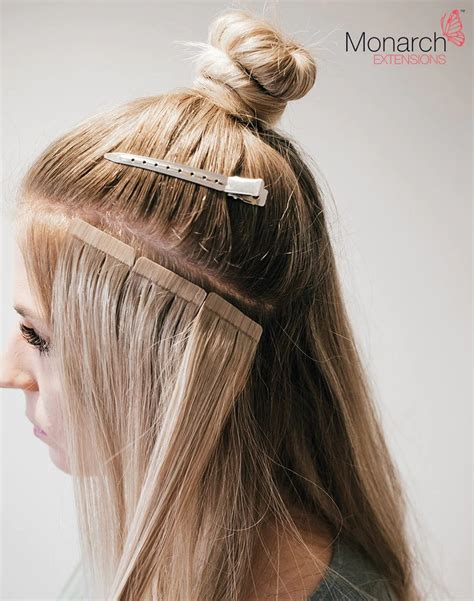What is Tape for Extensions?
Tape for extensions, also known as tape-in extensions, is a revolutionary hair extension method that relies on double-sided tape to attach human or synthetic hair wefts to your natural hair. This non-damaging technique results in a seamless, natural-looking head of hair that can instantly transform your length, volume, and style.

Benefits of Tape for Extensions
- Quick and Easy Installation: Typically taking 1-2 hours, tape-in extensions offer the fastest and easiest installation process among all hair extension methods.
- Non-Damaging: Unlike glue-in or sew-in extensions, tape-in extensions do not require heat or harmful chemicals, minimizing damage to your natural hair.
- Versatile Styling: Tape-in extensions allow for endless styling options, from sleek ponytails to voluminous curls, providing endless possibilities for self-expression.
- Long-Lasting: With proper care, tape-in extensions can last up to 8-12 weeks before needing to be removed and re-taped.
- Cost-Effective: Compared to some other extension methods, tape-in extensions are relatively affordable, making them a budget-friendly option for achieving thicker, longer hair.
Pain Points of Tape for Extensions
- Occasional Shedding: As natural hair growth occurs, tape-in extensions may occasionally shed due to the weakening of the tape bond.
- Potential Thinning: If not properly installed and maintained, tape-in extensions can lead to slight thinning of your natural hair.
- Sensitivity: Some individuals may experience minor sensitivity to the adhesive used in tape-in extensions.
Motivations for Using Tape for Extensions
- Length and Volume: Tape-in extensions provide an instant solution for achieving longer, fuller hair.
- Add Color and Highlights: Extensions can be colored or highlighted to create a subtle or dramatic change in hair color without damaging your natural locks.
- Fix Thinning Hair: Tape-in extensions can help conceal thinning hair by adding density and volume.
- Special Occasions: Tape-in extensions are perfect for special occasions like weddings, proms, and photo shoots when you want your hair to look its best.
Effective Strategies for Choosing and Applying Tape for Extensions
- Consult a Professional: Visit a certified hair extension specialist for proper consultation and application to ensure the best results.
- Choose High-Quality Extensions: Invest in high-quality 100% human hair or premium synthetic extensions for long-lasting and natural-looking results.
- Match Color and Texture: Match the extensions to your natural hair color and texture as closely as possible to create a seamless transition.
- Proper Application: Ensure that the extensions are firmly attached to your natural hair using high-quality tape and a professional application technique.
Tips and Tricks for Maintaining Tape for Extensions
- Brush Regularly: Use a soft-bristled brush to gently remove tangles and prevent matting.
- Avoid Heat Styling: Excessive heat styling can weaken the tape bond. Use heat protectant sprays and keep the heat tools at a low setting.
- Wash Less Frequently: Over-washing can shorten the lifespan of the extensions. Wash them every 2-3 days using sulfate-free shampoos and conditioners.
- Use Extension-Safe Products: Avoid products containing alcohol or sulfates, as they can damage the tape bonds.
- Regular Maintenance: Schedule regular maintenance appointments with your hairstylist for professional removal and re-attachment of the extensions.
Applications of Tape for Extensions
Beyond traditional hair enhancement, tape-in extensions can be used to:
- Create Layered Looks: Add layers and texture to your hair without the need for a haircut.
- Volume Boost: Instantly add volume and fullness to thin or fine hair.
- Artistic Designs: Create intricate hair designs by using extensions of different colors or textures.
- Bold Bangs: Get trendy bangs without committing to a permanent haircut.
- Ponytail Extensions: Transform a short or medium-length ponytail into a long, flowing showstopper.
Tables
| Type of Tape for Extensions | Benefits | Drawbacks |
|---|---|---|
| Human Hair Extensions | Natural-looking, high-quality, long-lasting | More expensive, require more maintenance |
| Synthetic Hair Extensions | Affordable, easy to style, low-maintenance | Less natural-looking, shorter lifespan |
| Double-Sided Tape Extensions | Strong hold, secure, less visible | Can be difficult to remove, potential for damage if not applied properly |
| Single-Sided Tape Extensions | Easier to remove, less damaging | Weaker hold, may require more frequent maintenance |
| Pain Points of Tape for Extensions | Solutions |
|---|---|
| Shedding | Proper installation, use a strong hairspray, apply a keratin sealant |
| Thinning | Avoid over-brushing, use gentle styling tools, schedule regular maintenance |
| Sensitivity | Use hypoallergenic tape, consult a doctor if necessary |
| Effective Strategies for Choosing and Applying Tape for Extensions |
|—|—|
| Choose high-quality extensions | Consult a professional | Match color and texture |
| Use proper installation technique | Use a strong hairspray | Apply a keratin sealant |
| Tips and Tricks for Maintaining Tape for Extensions |
|—|—|
| Brush regularly | Avoid heat styling | Wash less frequently |
| Use extension-safe products | Schedule regular maintenance | Use a satin pillowcase |
